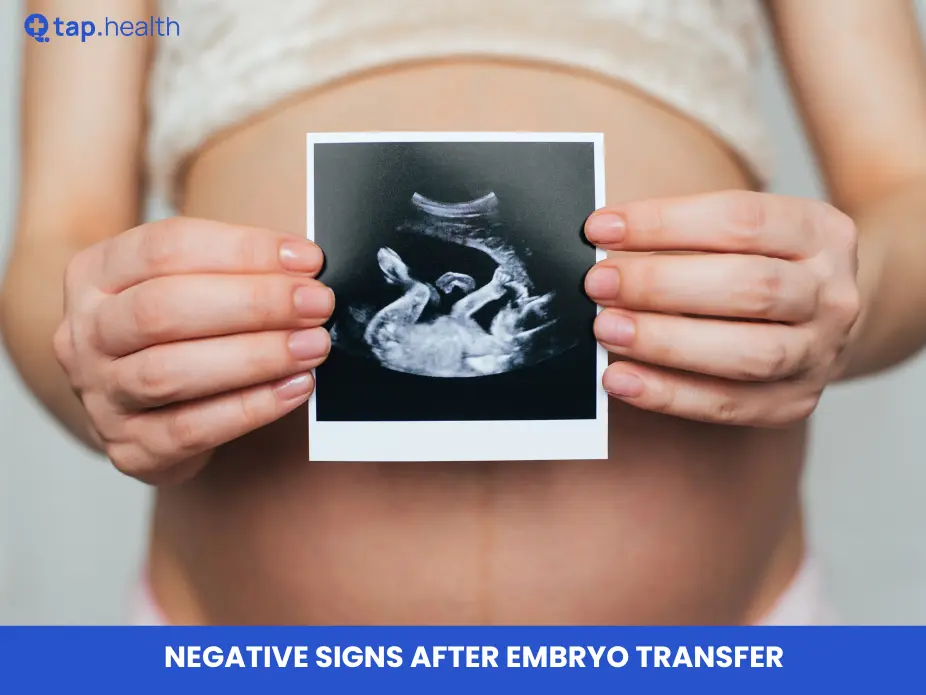Embryo transfer is a pivotal step in the in vitro fertilization (IVF) process, marking a hopeful milestone for those seeking pregnancy. However, the days following the procedure can bring uncertainty, especially when unexpected symptoms arise. While mild discomfort is common, certain negative signs may indicate complications requiring medical attention. This guide explores these signs, their implications, and when to seek help, providing clarity for those navigating the post-transfer phase.
Understanding Embryo Transfer and Its Outcomes
What is embryo transfer in IVF?
Embryo transfer involves placing a fertilized embryo into the uterus, aiming for successful implantation and pregnancy. Performed using a thin catheter under ultrasound guidance, the procedure is straightforward, with patients typically resting briefly before returning home. Implantation, where the embryo attaches to the uterine lining, occurs in the days following, triggering the production of human chorionic gonadotropin (hCG), the pregnancy hormone.
What factors influence embryo transfer success?
Success depends on embryo quality, uterine receptivity, and the patient’s overall health. While many hope for positive pregnancy symptoms, the absence of symptoms or the presence of concerning signs can cause worry. Recognizing the difference between normal and negative symptoms is crucial for timely intervention.
Common vs. Concerning Symptoms After Embryo Transfer
What are expected symptoms after embryo transfer?
Mild symptoms are normal as the body adjusts post-transfer. These include:
- Light spotting or implantation bleeding
- Mild cramping
- Breast tenderness
- Fatigue
- Mood swings
What are negative signs to watch for?
Certain symptoms may signal complications, requiring immediate attention. Below is a comparison of expected and concerning outcomes:
| Expected Outcomes | Unexpected Outcomes |
|---|---|
| Light spotting | Heavy vaginal bleeding |
| Mild cramping | Severe abdominal pain or cramping |
| Breast tenderness | Persistent nausea or vomiting |
| Fatigue and tiredness | High fever (above 100.4°F or 38°C) |
| Mood swings | Absence of symptoms after extended period |
If you experience any unexpected symptoms, consult your fertility specialist promptly.
15 Negative Signs After Embryo Transfer to Monitor
Here are 15 concerning symptoms that may indicate complications after embryo transfer, along with their potential implications and recommended actions.
1. Heavy Bleeding
Description: Significant blood flow resembling a menstrual period, beyond light spotting. Implications:
- May suggest miscarriage or failed implantation.
- Rarely, it could indicate an ectopic pregnancy. Action: Contact your fertility specialist immediately for an ultrasound or diagnostic tests.
2. Severe Abdominal Pain
Description: Intense pain exceeding typical post-transfer cramping. Implications:
- Possible ovarian hyperstimulation syndrome (OHSS).
- Could indicate an ectopic pregnancy. Action: Seek medical evaluation, as imaging may be needed.
3. Persistent Heavy Cramping
Description: Ongoing or intense cramping that persists beyond mild discomfort. Implications:
- May signal excessive uterine contractions or implantation issues. Action: Consult your doctor for further assessment.
4. High Fever
Description: Temperature above 100.4°F (38°C), often with chills or sweating. Implications:
- May indicate an infection or severe OHSS. Action: Seek medical attention for diagnostic testing.
5. Severe Nausea or Vomiting
Description: Persistent or intense nausea and vomiting beyond mild symptoms. Implications:
- Could be linked to OHSS or other complications. Action: Contact your doctor if symptoms persist.
6. Unusual Vaginal Discharge
Description: Discharge that is green, yellow, or foul-smelling. Implications:
- May indicate an infection or other issues. Action: Report to your healthcare provider for testing.
7. Painful Intercourse
Description: Discomfort during intercourse post-transfer. Implications:
- May result from uterine sensitivity or complications. Action: Discuss with your fertility specialist.
8. Dizziness or Lightheadedness
Description: Feeling unsteady or near-fainting. Implications:
- Could be due to hormonal changes or OHSS. Action: Consult your doctor if severe or persistent.
9. Persistent Fatigue
Description: Extreme tiredness impacting daily life. Implications:
- May be linked to OHSS or other health concerns. Action: Discuss with your healthcare provider.
10. Shortness of Breath
Description: Difficulty breathing or feeling out of breath. Implications:
- Could indicate blood clots or OHSS-related complications. Action: Seek immediate medical attention.
11. Severe Back Pain
Description: Intense lower back pain. Implications:
- May be caused by OHSS or abdominal pressure. Action: Report to your healthcare provider.
12. Excessive Bloating
Description: Abnormal abdominal swelling and discomfort. Implications:
- Often linked to OHSS or other complications. Action: Consult your doctor if severe.
13. Severe Headaches
Description: Persistent or intense headaches. Implications:
- May result from hormonal changes or OHSS. Action: Discuss with your healthcare provider if unresponsive to treatment.
14. Changes in Cervical Mucus
Description: Noticeable changes in mucus color, consistency, or volume. Implications:
- Could indicate infection or complications. Action: Report to your doctor for evaluation.
15. Metallic Taste in Mouth
Description: A persistent metallic taste (dysgeusia). Implications:
- May be due to hormonal fluctuations or other issues. Action: Consult your doctor if persistent or accompanied by other symptoms.
Emotional and Psychological Signs to Address
How does IVF affect emotional health?
The IVF journey, including embryo transfer, can be emotionally taxing. Anxiety, sadness, or mood swings are common due to hormonal changes and the stress of awaiting results. Persistent or overwhelming emotions warrant professional support.
What are concerning emotional signs?
- Unexplained Anxiety or Depression: Intense or prolonged anxiety or sadness may require counseling or support groups to manage the emotional toll of IVF.
- Sleep Disturbances: Trouble sleeping, frequent waking, or vivid dreams can stem from stress or hormonal shifts. Relaxation techniques like meditation or yoga may help, but persistent issues should be discussed with a doctor.
When to Seek Medical Advice
When should you contact your doctor?
Immediate medical attention is needed for:
- Heavy vaginal bleeding
- Severe abdominal or back pain
- High fever
- Shortness of breath
- Persistent nausea or vomiting
For less urgent but persistent symptoms, such as fatigue, unusual discharge, or emotional distress, consult your fertility specialist to rule out complications like OHSS or ectopic pregnancy. Trust your instincts and communicate openly with your healthcare team.
Understanding Negative Pregnancy Tests
What does a negative pregnancy test mean?
A negative test can be disheartening but doesn’t always confirm failure. Testing too early or fluctuating hCG levels can lead to false negatives. If you test negative but have no period or experience symptoms, consult your doctor for a blood test to measure hCG levels accurately.
How long should you wait to test?
Wait 10-12 days post-transfer for reliable results, allowing time for implantation and hCG production.
FAQs About Negative Signs After Embryo Transfer
1. What does the absence of symptoms mean after embryo transfer?
Not experiencing symptoms doesn’t indicate failure. Some women have successful pregnancies without noticeable signs, as hCG responses vary.
2. How long should I wait to take a pregnancy test?
Wait 10-12 days for accurate results, as earlier testing may miss low hCG levels.
3. Is cramping without other symptoms normal?
Yes, mild cramping is common and may not indicate pregnancy. Consult your doctor if it’s severe or persistent.
4. Can stress impact embryo transfer success?
While stress’s direct impact on implantation is unclear, managing stress supports overall well-being during IVF.
5. What should I do if I experience negative signs?
Contact your fertility specialist for personalized advice and diagnostic tests to address concerns.
Conclusion
Navigating the post-embryo transfer period can be challenging, with both physical and emotional hurdles. While mild symptoms are normal, recognizing negative signs like heavy bleeding, severe pain, or persistent fatigue is critical for timely intervention. Open communication with your healthcare provider ensures prompt management of potential complications, supporting your journey toward a successful pregnancy. Stay vigilant, trust your instincts, and seek support when needed.



